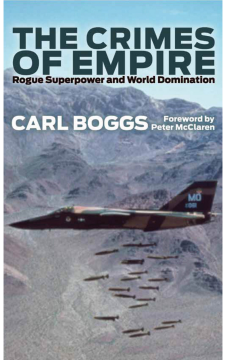
Additional Information
Book Details
Abstract
Imperial nations advance their own interests by exploiting other societies. To those on the receiving end this is obvious, while inside the empire, a powerful ideological system of justification tends to hide all but the worst excess.
Carl Boggs argues that that the US began life two centuries ago as a nascent colonialist regime plundering and conquering the Native Tribes. The Indian wars were followed by perpetual militarism and warfare fuelled by a deep sense of national exceptionalism. The Crimes Of Empire examines several trends in this process, and illustrates the new depths plumbed since 9/11.
Violation of international agreements, treaties and laws, the use of prohibited weapons, support for death squads and torture are just some of the practices that America uses to prove technical superiority and media control, thus prolonging the American nightmare.
'Relentless, unflinching, and irrefutable. This book performs a genuine service for truth and democracy, an education for every American'
Michael Parenti, author of Against Empire and To Kill a Nation
'Distinguished scholar Carl Boggs's brilliant historical survey of US empire-building highlights the centrality of violence, lawlessness, and self-serving 'humanitarian' ideology, from colonial times to the current wars in Asia'
James Petras, Bartle Professor Emeritus, Binghamton University
'Americans think others commit war crimes. Every American who believes in their country's greatness should read Crimes of Empire. By refusing to let war crimes pass unnoticed, Carl Boggs has done humankind a tremendous service'
George Katsiaficas
Table of Contents
| Section Title | Page | Action | Price |
|---|---|---|---|
| Cover | Cover | ||
| Foreword by Peter McClaren | vii | ||
| Preface | xiii | ||
| Introduction | 1 | ||
| 1. Crimes Against Peace | 26 | ||
| Forgetting Nuremberg | 27 | ||
| Superpower Ethics | 34 | ||
| Descent into Lawlessness | 44 | ||
| 2. Warfare Against Civilians | 48 | ||
| World War II and its Legacy | 49 | ||
| Collateral Damage\" or Mass Murder? | 52 | ||
| Arial Terrorism: From Tokyo to Baghdad | 64 | ||
| A Pattern of Atrocities | 73 | ||
| A Culture of Denial | 83 | ||
| 3. War Crimes by Proxy | 89 | ||
| A History of Abiding and Abetting | 90 | ||
| Central America: Second-Hand Terrorism | 93 | ||
| Yugoslavia: \"Humanitarian\" Warfare | 97 | ||
| Israel Client-State Outlawry | 100 | ||
| Perpetual War | 110 | ||
| 4. Weapons of Mass Destruction | 112 | ||
| Economic Sanctions: Terror by Other Means | 115 | ||
| The Nuclear Madness Continues | 117 | ||
| A Legacy of Toxic Warfare | 126 | ||
| The Biowarfare Option | 133 | ||
| Empire and Barbarism | 137 | ||
| Postscript: The WMD Commission | 138 | ||
| 5. A Tale of Broken Treaties | 144 | ||
| Lawlessness: An American Legacy | 147 | ||
| Subverting the United Nations | 153 | ||
| Genocide Accords: The Great Retreat | 159 | ||
| Imperialism in Space | 166 | ||
| Global Warming: The Triumph of Corporate Profits | 169 | ||
| 6. War-Crimes Tribunals: Imperial Justice | 176 | ||
| The Nurmeberg Precedent-and Beyond | 176 | ||
| NATO's Hague Travesty | 180 | ||
| The Hussein Tribunal: Counterfeit Justice | 190 | ||
| The International Criminal Court | 196 | ||
| The US Assault on International Law | 199 | ||
| 7. Torture and Other Atrocities | 207 | ||
| The Historical Labyrinth | 209 | ||
| Guantanamo: The New Devil's Island | 217 | ||
| Abu Ghraib: Chamber of Horrors | 223 | ||
| Mercenary Terrorism | 232 | ||
| Outlawry and Denial | 237 | ||
| Conclusion: Empire or Survival? | 241 | ||
| Postscript: The Routinization of Mass Murder | 249 | ||
| Notes | 262 | ||
| Index | 277 |
